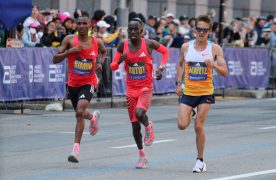A Sikh mother and her three boys were having a normal evening at home in New Delhi, India, sometime in November 1984. The mother was preparing dinner, when suddenly a gang of men savagely entered the house. The men began beating the boys, then restrained the mother before raping her in front of her children. The eldest son was taken outside and coated in kerosene. Then he was set ablaze, burnt alive.
“The method of killing was always the same,” said College of Engineering junior Roop Singh. “The men were hit in the head, kerosene was poured over them and then they were burned alive.”
Friday night, a group of about 50 students gathered inside Marsh Chapel to honor those who were tortured and killed in the 1984 Anti-Sikh Pogroms with a candlelight vigil. The event was organized by the members of the Sikh Association at Boston University.
The vigil was attended by both SABU members and non-members, which came from BU and other local schools. Sikh and non-Sikh BU students said they attended the vigil to learn about what happened in 1984 and to pay their respects to those who died.
“It’s all about awareness,” said SABU member and College of Arts and Sciences freshman Gobind Singh. He said the most important thing we can do is to make more people conscious of the injustices occurring in New Delhi and other parts of India. Once more people are aware, there will be more pressure on the Indian authorities to reduce the violence against the native Sikhs.
The vigil was the third annual event organized by SABU. To begin, attendees gathered within the temple to hear various speakers discuss the history of the Sikh religion and to recount the events of 1984. They then proceeded outside to the front of the church where gatherers held candles and bowed their heads in a moment of silence devoted to prayer for those who died.
“The point today was to educate those who aren’t aware and for those who are aware to be given a chance to reflect on what happened in November of 1984,” said School of Management senior Monna Gandhi, the president of SABU.
The Anti-Sikh Pogroms of 1984 were the result of a heated struggle which lasted for decades between the Indian government and the Sikhs. On June 4, 1984, Indian Prime Minister Indira Gandhi started Operation Bluestar, calling for the Indian Army to invade the holiest shrines of the Sikhs throughout India. In this process, over 30 Gurwaras — Sikh Temples — were assailed and thousands of people were injured or killed.
Following those invasions, Ghandi was assassinated by two Sikh security guards on Oct. 31, 1984. Tensions escalated between the Indian Congress party and the Sikhs, resulting in the Anti-Sikh Pogroms of 1984. The in-house invasions and public killing sprees went on for days, and the injustices were not stopped by police because most of the men involved in the violence were closely tied to the government.
Somewhere between 5,000 and 6,000 affidavits were made as a result of the Pogroms, but not one arrest was made. Today, the injustices continue, and though not to the extent of the 1984 Pogroms, they are still incurring much pain on the Sikh people residing in India today.
SABU is made up of about 50-60 members who concentrate their actions on current issues. They hold their worship in a Gurwara in Milford, Mass. Sikhism was founded about 500 years ago and harbors over 20 million people worldwide. The religion focuses on the equality of all people no matter their race, sex or nationality. They believe in one god and encourage honesty, compassion, humility and community service among their daily actions.
This is an account occasionally used by the Daily Free Press editors to post archived posts from previous iterations of the site or otherwise for special circumstance publications. See authorship info on the byline at the top of the page.













